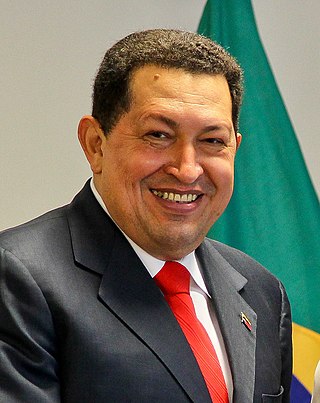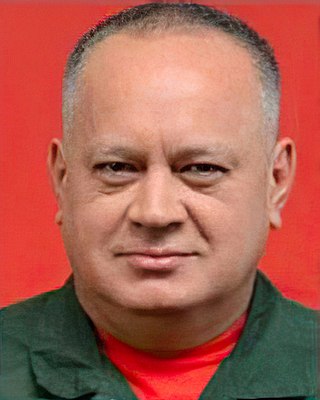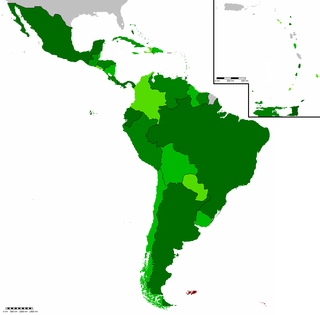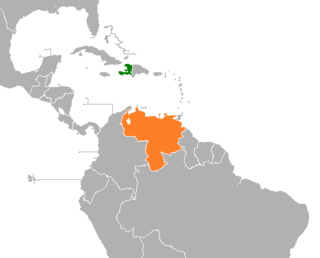Related Research Articles

The Organization of American States is an international organization that was founded on 30 April 1948 for the purposes of solidarity and co-operation among its member states within the Americas. Headquartered in the United States capital, Washington, D.C., the OAS has 35 members, which are independent states in the Americas. Since the 1990s, the organization has focused on election monitoring. The secretary general of the OAS is Uruguayan Luis Almagro.

The foreign relations of Venezuela had since the early twentieth century been particularly strong with the United States. However, since the election of Hugo Chávez as President of Venezuela in 1998, Venezuela's foreign policy differed substantially from that of previous Venezuelan governments. This change in foreign policy direction continues under the current president Nicolás Maduro.

Hugo Rafael Chávez Frías was a Venezuelan politician who was president of Venezuela from 1999 until his death in 2013, except for a brief period in 2002. Chávez was also leader of the Fifth Republic Movement political party from its foundation in 1997 until 2007, when it merged with several other parties to form the United Socialist Party of Venezuela (PSUV), which he led until 2012.

Diosdado Cabello Rondón is a Venezuelan politician and current member of the National Assembly of Venezuela, where he previously served as Speaker. He is also an active member of the Venezuelan armed forces, with the rank of captain.
The Inter-American Commission on Human Rights is an autonomous organ of the Organization of American States (OAS).

The General Assembly is the supreme decision-making body of the Organization of American States (OAS).

A failed coup d'état on 11 April 2002 saw the president of Venezuela, Hugo Chávez, ousted from office for 47 hours before being restored to power. Chávez was aided in his return to power by popular support and mobilization against the coup by loyal ranks in the military. By early 2002, Chávez's approval rating had dropped to around 30%, with many business, church and media leaders feeling Chávez's use of emergency powers to bypass the National Assembly and institute significant government changes made him a "dictator-in-training." Meanwhile, the growing dissatisfaction with Chávez among those in the military due to his aggressive manner and alliances with Cuba and paramilitaries led multiple officers to call on Chávez to resign. Demonstrations and counter-demonstrations took place on a weekly basis as the country became increasingly divided, while the private media ran a steady stream of negative stories about Chávez. Retired military officers, former politicians, union leaders, and spokespeople for the Catholic Church claimed they had military support to remove Chávez from power, with an April 6 CIA intelligence report warning that plotters would try to exploit social unrest from upcoming opposition demonstrations for his removal. American officials warned Chávez of a likely coup attempt, though Chávez ignored their warnings.

José Miguel Insulza Salinas is a Chilean politician, lawyer, and academic serving as a senator for the Arica y Parinacota Region since 2018. He previously served as Minister of Foreign Affairs from 1994 to 1999 and Minister Secretary-General of the Presidency from 1999 to 2000 under president Eduardo Frei Ruiz-Tagle, as Minister of the Interior from 2000 to 2005 under president Ricardo Lagos, and as Secretary General of the Organization of American States from 2005 to 2015.

Since 2 February 1999, Venezuela saw sweeping and radical shifts in social policy, moving away from the last governments officially embracing a free-market economy and liberalization reform principles and towards income redistribution and social welfare programs.

Nicolás Maduro Moros is a Venezuelan politician and president of Venezuela since 2013.

Relations between Cuba and Venezuela were established in 1902. The relationship deteriorated in the 1960s and Venezuela broke relations in late 1961 following the Betancourt Doctrine policy of not having ties with governments that had come to power by non-electoral means. A destabilizing factor was the Cuban support for the antigovernment guerrilla force that operates in remote rural areas. Venezuela broke off relations with Cuba after the Machurucuto invasion in 1967, when Cuban trained guerrillas landed in Venezuela seeking to recruit guerrillas and overthrow the government of Raúl Leoni. Relations were reestablished in 1974.
International reaction to the 2009 Honduran coup d'état of June 28, 2009, was that the coup was widely repudiated around the globe. The United Nations, every other country in the Western Hemisphere and others, publicly condemned the military-led 2009 Honduran coup d'état and ouster of Honduran President Manuel Zelaya as illegal and most labelled it a coup d'état. The Obama administration, along with all other governments in the hemisphere, branded the action a "coup." Every country in the region, except the United States, withdrew their ambassadors from Honduras. All ambassadors of the European Union were recalled. Venezuela said it would suspend oil shipments, and Honduras's neighbors — El Salvador, Guatemala and Nicaragua - stopped overland trade for 48 hours. The World Bank and Inter-American Development Bank suspended lending to Honduras.

The Community of Latin American and Caribbean States (CELAC) is a regional bloc of Latin American and Caribbean states proposed on February 23, 2010, at the Rio Group–Caribbean Community Unity Summit, and created on December 3, 2011, in Caracas, Venezuela, with the signature of The Declaration of Caracas. It consists of 33 countries in Latin America and the Caribbean having five official languages.

All 35 independent nations of the Americas are member states of the Organization of American States (OAS).

Haiti–Venezuela relations are relations between Haiti and Venezuela. Venezuela has an embassy in Port-au-Prince, and Haiti has an embassy in Caracas.

Luis Leonardo Almagro Lemes is a Uruguayan lawyer, diplomat, and politician who currently serves as the 10th Secretary General of the Organization of American States (OAS) since 2015. A former member of the Broad Front, Almagro served as Minister of Foreign Relations of Uruguay from 2010 to 2015 under president José Mujica.

On 29 March 2017, the Supreme Tribunal of Justice (TSJ) of Venezuela took over legislative powers of the National Assembly. The Tribunal, mainly supporters of President Nicolás Maduro, also restricted the immunity granted to the Assembly's members, who mostly belonged to the opposition.

Constituent Assembly elections were held in Venezuela on 30 July 2017 to elect the members of the 2017 Constituent National Assembly. Unlike the 1999 Constituent National Assembly, which was assembled following a referendum, the 2017 election was convened by the presidential decree of President Nicolás Maduro. Smartmatic, the Venezuelan-owned company which provided the voting machines, stated that the results were tampered with by the CNE, and that the turnout was off by at least one million votes.

During the 2019 Venezuelan presidential crisis, AP News reported that "familiar geopolitical sides" had formed, with allies Russia, China, Iran, Turkey, Syria, and Cuba supporting Maduro, and the US, Canada, and most of Western Europe supporting Juan Guaidó as interim president. Amid widespread condemnation, President Maduro was sworn in on 10 January 2019, and the President of the National Assembly, Guaidó, was declared the interim President by that body on 23 January 2019. Intervention by the United States in Venezuela has been alleged by allies of Nicolás Maduro and political figures from the left spectrum; Maduro's government states that the crisis is a "coup d'état led by the United States to topple him and control the country's oil reserves." Guaidó denies the coup allegations, saying peaceful volunteers back his movement. A memo obtained by Agence France-Presse indicated USAID would allocate $41.9 million of its Central American aid fund to support Guaidó administering Venezuela, including $19.4 million for salaries, travel, and "other costs necessary to ensure full deployment of a transparent financial management system and other activities necessary for a democratic transition," as well as $2 million to support the opposition in negotiations with the Maduro administration.
References
- ↑ The Carter Center, "The Carter Center Americas Program" , retrieved 2008-07-21
- ↑ Press Briefing By Philip T. Reeker Archived 2007-06-14 at the Wayback Machine U.S. State Department, 11 September 2001; retrieved 2007-06-01.
- ↑ Declaración del Grupo de Río sobre la situación en Venezuela Archived 2012-02-07 at the Wayback Machine , Rio Group, 12 April 2002; retrieved 2007-06-01.
- ↑ Bush Must Re-Embrace Latin Leaders After Break Over Chávez Andrew Reding, Pacific News Service, 19 April 2002; retrieved 2007-06-01.
- ↑ Declaración del Presidente Fox sobre la situación actual en Venezuela Archived 2018-11-11 at the Wayback Machine Office of the President of the United Mexican States, 12 April 2002; retrieved 2007-06-01.
- ↑ Chavez and Fox recall ambassadors BBC News, 14 November 2005; retrieved 2007-06-01.
- ↑ Kerry: The United States is ready to impose sanctions on Venezuela Archived 2014-03-13 at the Wayback Machine , El Universal (Caracas), 12 March 2014; retrieved 2014-03-13.
- ↑ "Why Venezuela Must be Expelled from the OAS". HuffPost. 2016-06-09. Retrieved 2023-04-19.